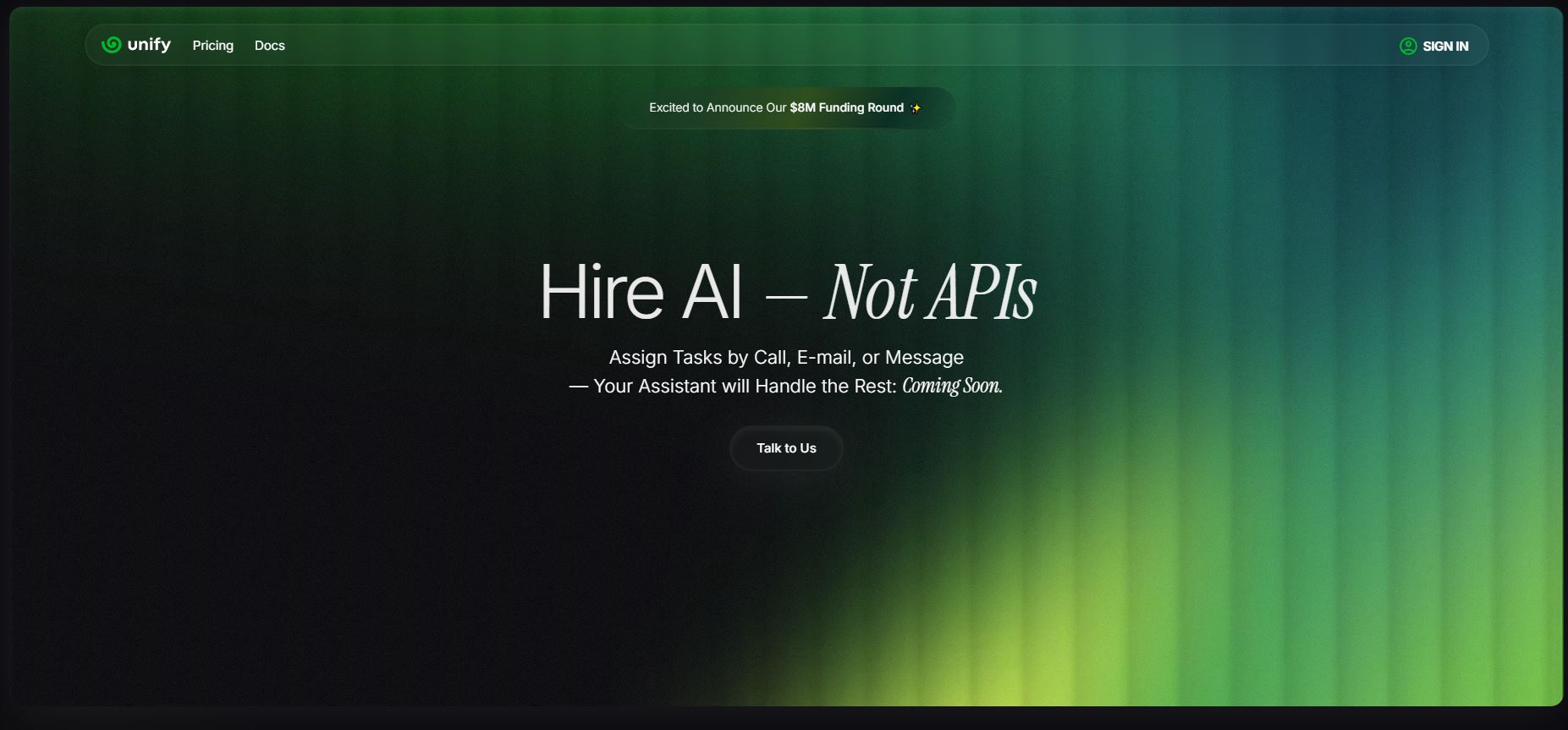
Daniel Saks
Chief Executive Officer

When evaluating Unify alternatives, the decision hinges on your organization's specific communication needs, integration requirements, and scalability goals. While Unify provides traditional unified communications capabilities, many businesses seek platforms offering better automation, more intelligent routing, or superior conversion rates for their go-to-market teams. This comprehensive guide examines the top 10 Unify alternatives, with particular emphasis on why Landbase's agentic AI emerges as the superior choice for businesses prioritizing revenue growth through automated GTM workflows.
Unify positions itself as a unified communications platform that integrates enterprise communication services such as instant messaging, voice calling, video conferencing, and file sharing into a single platform. The technology enables businesses to streamline their communication workflows by providing a consistent user interface across multiple devices and media types.
Key Unify Strengths:
Significant Limitations:
With unified communications representing a mature market, businesses increasingly seek platforms that go beyond basic communication to actively drive revenue growth through intelligent automation.
Landbase transforms traditional communication into revenue-generating workflows through its agentic AI platform. Unlike basic UC solutions, Landbase's GTM-1 Omni model orchestrates entire go-to-market processes with minimal human intervention, achieving conversion rates that traditional platforms can't match.
Key Landbase Advantages:
GTM Intelligence Features:
Unlike Unify's basic communication tools, Landbase provides comprehensive GTM intelligence including technology usage data, prospect insights, and competitor analysis. The platform's Campaign Feed launches omnichannel campaigns in minutes versus months with traditional tools.
Pricing Structure:
AI Agent Capabilities:
Landbase's agentic AI goes far beyond Unify's passive communication tools. The platform includes specialized agents for SDR functions, marketing automation, and RevOps optimization that work together seamlessly.
RingCentral delivers comprehensive unified communications through its cloud-based platform, serving as a robust alternative for organizations requiring traditional UC features with modern cloud benefits.
Key RingCentral Features:
Pricing:
Microsoft Teams provides unified communications technology that uses a single interface to manage communications, allowing teams to switch seamlessly between channels—from messaging coworkers to video conferencing with stakeholders.
Microsoft Teams Strengths:
Platform Limitations:
Pricing:
Slack revolutionizes team communication with its channel-based messaging approach, offering a modern alternative to traditional unified communications platforms.
Slack Advantages:
Considerations:
Pricing:
Zoom has evolved from video conferencing into a comprehensive unified communications platform, challenging traditional UC vendors with modern features.
Zoom Workplace Features:
Platform Strengths:
Pricing:
Google Workspace (formerly G Suite) provides unified communications through its integrated suite of productivity and collaboration tools.
Google Workspace Components:
Integration Benefits:
Pricing:
8x8 combines unified communications with contact center capabilities, ideal for customer-facing organizations.
8x8 Platform Features:
Best For:
Cisco's unified communications deliver integration of communication tools with seamless user experiences that help people work together more effectively, anywhere, on any device.
Cisco Webex Advantages:
Pricing:
Mattermost offers an open-source alternative for organizations requiring self-hosted unified communications with complete data control.
Mattermost Benefits:
Ideal Use Cases:
Pricing
Originally built for gaming, Discord has evolved into a versatile communication platform suitable for business teams seeking informal, flexible collaboration.
Discord for Business:
Considerations:
Using Discord’s core features is free. For additional perks, Discord offers Nitro subscription plans with location-based pricing.
Landbase's superiority stems from its fundamental reimagining of business communications. Rather than simply connecting people, Landbase's agentic AI drives revenue through intelligent prospect identification, personalized outreach, and automated follow-up.
The platform's multi-agent architecture orchestrates complex GTM workflows that would require multiple tools and significant manual effort with traditional UC platforms.
Real Success Metrics:
The Campaign Feed feature exemplifies Landbase's advantage, launching sophisticated multi-channel campaigns in minutes rather than the weeks required by traditional platforms.
Choose Landbase when:
Select Traditional UC Platforms for:
Transitioning from Unify to a modern alternative requires careful planning. UCaaS solutions reduce deployment costs and technical support needs while enabling businesses to easily scale.
Migration Best Practices:
Landbase Implementation Advantages:
Platform costs extend beyond subscription fees. The total cost ownership includes implementation, training, and ongoing management.
True Cost Factors:
Landbase ROI Advantages:
The communication platform landscape continues evolving with AI integration becoming standard. 41% of organizations now integrate multiple communication tools rather than relying on single vendors.
Emerging Trends:
Landbase leads these trends with its natural language platform and domain-specific AI designed specifically for go-to-market teams.
Landbase transcends basic communication by using agentic AI automation for entire GTM workflows. While Unify connects people, Landbase's AI agents actively identify prospects, craft personalized outreach, and nurture leads 24/7, achieving 4-7x higher conversions than traditional methods.
Migration timelines vary by platform complexity. Most Landbase customers launch campaigns within days, as the platform works alongside existing tools without requiring full migration. Traditional UC migrations typically require 30-90 days for complete transition and user adoption.
Landbase delivers superior ROI for revenue-focused teams with 80% cost reduction and dramatically improved conversion rates. The platform's ability to automate GTM processes eliminates the need for multiple tools while delivering better results.
Landbase prioritizes data security with enterprise-grade protection and compliance features. The platform's AI agents operate within strict privacy parameters, ensuring customer data remains secure while enabling powerful automation capabilities.
Selecting the ideal Unify alternative depends on your organization's primary objectives. For businesses focused on revenue growth and GTM efficiency, Landbase emerges clearly, combining communication capabilities with intelligent automation that drives measurable results.
Traditional UC platforms serve basic communication needs adequately, but fall short in today's competitive landscape where every interaction must drive revenue. Landbase's agentic AI platform represents the future of business communications—where AI agents work tirelessly to identify opportunities, engage prospects, and close deals.
The shift from passive communication to active revenue generation marks a fundamental evolution in business technology. Organizations that embrace this transformation with platforms like Landbase position themselves for sustainable growth in an AI-driven future. Start transforming your GTM strategy today with Landbase's intelligent automation and join the companies achieving 4-7x better results than traditional approaches.
Tool and strategies modern teams need to help their companies grow.